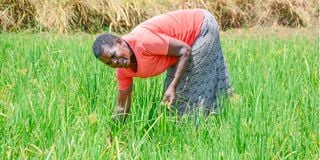Shattering the rice ceiling: Lonah Okumu's 41 years in rice farming

Lonah Anyango Okumu at her rice farm in Nyando Sub-county, on October 03, 2024. She has been a rice farmer for the last 40 years.
What you need to know:
- Lonah, a 63-year-old Kenyan farmer, transformed from a housewife to a successful rice farmer over four decades.
- Through education and adoption of innovative farming techniques, she increased her yields significantly, improving her family's livelihood and educating her seven children to university level.
- Her success has inspired other women in her community to become landowners and farmers, revolutionising gender roles in agriculture.
International Day of Rural Women
In the lush, verdant fields of Kisumu's Muhoroni Sub-county, where the horizon blends seamlessly with endless rows of swaying rice plants, a quiet revolution has been growing for four decades. At its heart stands Lonah Anyango Okumu, a 63-year-old farmer whose weathered hands and sun-kissed face tell a story of resilience, innovation, and unwavering determination.
Today, Lonah has grown into one of the biggest commercial farmers not only in Kisumu but in the entire Western region. Her success story drew our attention and we embarked on a journey to meet this remarkable woman.
The approximately two-hour trek from the Kisumu-Nairobi Road, followed by a gruelling 10.7 kilometre stretch on a rough road to Kiliti Centre on the Ahero-Miwani Road, was tiring but filled with anticipation.
At Ka Wandayi village in Ombeyi, Mama Lonah stands waiting at her gate, a warm smile on her face. Her faded red T-shirt, brown skirt, and dusty legs are testament to a day spent in her farm, located next to the National Irrigation Authority offices.
As pleasantries are exchanged and the interview begins in the native Dholuo, it is clear that Lonah's story is not just one of agricultural success, but of a woman deeply rooted in her community and culture.
The year was 1981 when Lonah, a young bride full of hope and dreams, arrived at Ka Wandayi Village in Ombeyi, Muhoroni Sub-county. The air was thick with the earthy scent of damp soil and the promise of new beginnings. Little did she know that this move would plant the seeds of a transformative journey, not just for her, but for an entire community of rural women.

Lonah speaks to Nation.Africa at her home in Kiliti village, Nyando Sub-county, on October 03, 2024.
Lonah's story begins like many others in rural Kenya. She left her home to marry Hezbone Okumu Yugi, a dedicated teacher in Ka Wandayi Village. As her husband went off to educate the young minds of the community, she found herself drawn to the rhythms of farm life that pulsed through the village.
In those early days, rice farming was the lifeblood of Ka Wandayi Village, especially for those without formal employment. It was a natural progression for Lonah to dip her toes into this world, starting her journey in 1983 with a modest plot of land.
Life, however, had other plans for her. In 2003, tragedy struck when her husband passed away, leaving her with seven children and a half-built dream in the form of an incomplete brick house.
"I had to make a big decision," Lonah recalls, her voice tinged with the echoes of that difficult time. "Whether to complete the brick house that is still standing here to date, or focus on ensuring my children attained education to the highest levels."
It was a crossroads that would define not just her future, but that of her children and, unknowingly at the time, the entire community. With unwavering resolve, she chose education over immediate comfort, a decision that would require her to dive deeper into rice farming than she had ever imagined.
Her decision to prioritise her children's education over material comfort set her on a path that would challenge societal norms and agricultural traditions. Starting with just four acres of land in 1983, she embraced rice farming with a fervour that would soon become legendary in the region.
In the early days, the National Irrigation Board played a crucial role in supporting farmers like Lonah. They provided essential services such as ploughing the land on loan, supplying fertilisers, and managing water for irrigation. This support system was vital for small-scale farmers trying to establish themselves in the industry.
Lonah remembers how rice farming was often dismissed as an insignificant cash crop, with many farmers satisfied with meagre profits.
"In the 90s and 80s, rice farming was not taken seriously as a cash crop," Lonah explains, shaking her head at the memory. "The yields were low, maybe 10 to 15 bags from an acre. It was barely enough to make ends meet."
But the challenges extended beyond mere economics. The gender dynamics of the time posed significant hurdles for women like her who aspired to be more than just labourers in the fields.
"The role women played in the farms then was only offering labour and doing the bulk of the work," Lonah recounts, a hint of past frustration creeping into her voice. "But when the farmers were paid by the board, almost all the money would go to the men's pockets. They would then go and waste all of it in Kisumu through merry-making and drinking."

Lonah Anyango Okumu displays her farm produce at her home in Kiliti village, Nyando Sub County, on October 03, 2024. She urged fellow women and young people to embrace farming, being that there are no instant white collar jobs available, adding that farming is also one of the best economic activities with great returns. Photo Credit: Alex Odhiambo.
This systemic inequality didn't just affect the women; it impacted entire families and communities. The old ways of farming, coupled with the mismanagement of resources, kept yields low and perpetuated a cycle of poverty.
As the new millennium approached, whispers of change began to rustle through the rice fields of Ahero and Ombeyi. Progressive farmers started recording yields of 20 bags per acre, a number that was unheard of in previous years.
The answer lay in education and innovation. Private companies marketing fertilisers, pesticides, and other agricultural products began to engage more actively with farmers. They organised demonstrations and trials, showing in real-time the dramatic differences that new farming techniques could make.
"I was among farmers who took the education seriously," Lonah states proudly. "The experts and private companies used trials and demos to illustrate the difference when new techniques are implemented, and this was the turning point to better healthier yields."
The year 2010 marked a watershed moment for rice farming in Ahero. A group of interns from various universities, armed with the latest agricultural research, descended upon the rice fields. Their arrival would transform not just the way rice was grown, but the entire socio-economic fabric of the community.
"The interns and researchers shared theoretical knowledge that helped me in farming while they followed our practical practices," Lonah explains. "Of course they changed our perspective on farming. It was like a veil had been lifted from our eyes."
Among these young revolutionaries was a team from Jomo Kenyatta University of Agriculture and Technology, led by Prof Bancy Mati, a doctor of Philosophy in Soil Water and Environmental Engineering. They introduced the System of Rice Intensification (SRI), a game-changing approach to rice cultivation.
The SRI method involved a package of practices that fundamentally changed how rice was grown in paddies. Instead of the traditional fully flooded paddy systems, SRI introduced alternate wetting and drying of paddies, which not only saved water but also promoted healthier root growth.
The impact of these new techniques was immediate and dramatic. Yields skyrocketed, with farmers now harvesting up to 40 bags per acre – more than double what was considered a good yield just a few years earlier.
"Having embraced this, when one gets a yield of 35 bags at the moment, it is almost a loss. In the past, we used to make a paltry Sh5,000 profit, but now after acquiring and implementing new techniques, I and many farmers now manage at least Sh30,000 profit," Lonah beams with pride.
This increased profitability wasn't just changing bank balances; it was changing lives. Lonah's success began to translate into success for her family. With her increased income, she was able to invest more in her children's education, fulfilling the promise she had made to herself years ago.
"Farming has been not only my employer but my provider for school fees, upkeep and food," she says, her voice swelling with pride. "When my husband died, my first born was in Form Four and my last born was only a year old, but now through farming, six of my children have graduated and the last born will do so at the end of this year."
The fruits of her labour and sacrifice are evident in her children's achievements. Her eldest son is a civil engineer. Among her other children are a pharmacy technician, an IT engineer, a banker, and graduates in economics and law.
Her success has rippled out far beyond her own family. Her farming success has earned her immense respect in the community. Today, she regularly hosts visitors seeking advice on farming techniques and ideas.
"Rice farming has opened my eyes, elevated me in the community, improved my networks and helped me relate with others better," Lonah reflects. "I usually feel proud when I am appreciated by others across the rice schemes and across the country since I am an expert."
Leased farms
But perhaps the most significant impact of Lonah's success has been on other women in the community. Inspired by her example, many women are now following in her footsteps, revolutionising their involvement in rice farming.
"From labourers to land owners, now women have their own farms. Most of them have leased farms in blocks and are even hiring men to work for them," Lonah says. "It's a complete reversal of how things used to be."
This shift isn't just changing the economic landscape; it's reshaping social dynamics. She notes that many men now prefer to work for women landowners, finding them more empathetic and understanding employers.
The impact extends to the younger generation as well. Young girls in the community are increasingly engaged in farming, particularly during school holidays when they help with transplanting seedlings. This not only provides them with pocket money but also instils the value of agriculture and hard work in them.
Despite the many successes, Lonah and her fellow farmers still face significant challenges. The availability and affordability of fertiliser remain ongoing issues. While government vouchers are available, they are limited to four bags per farmer, forcing many to seek additional supplies through agencies at inflated prices.
"We have to cough out Sh3,500 to pay for a bag that is supposed to cost Sh2,500 when we acquire them through agencies or agrovets," Lonah explains, frustration evident in her voice.
Crop diseases pose another constant threat, requiring vigilance and expertise to manage effectively. And then there are the Quelea birds, whose voracious appetite for rice can decimate a crop if left unchecked.
Yet, amid these challenges, her passion for rice farming remains undiminished. "Rice farming is not a white collar job but it is the best decision I have ever made," she declares with conviction. "We have to transit fully from subsistence farming to fully commercial."
As Lonah looks to the future, she sees endless possibilities not just for herself, but for the entire community of rural women farmers. She is a strong advocate for diversification, encouraging farmers to explore alternatives to rice during off-seasons.
"Apart from rice farming, I also have livestock, which include 12 cows and three calves. I also engage in farming of water melon, tomatoes and indigenous vegetables as an alternative to rice during the season," Lonah shares.
As the sun sets over the rice paddies of Ka Wandayi Village, casting a golden glow across the landscape, Lonah stands tall among the swaying plants.





